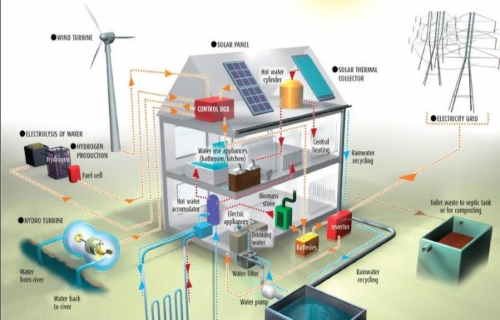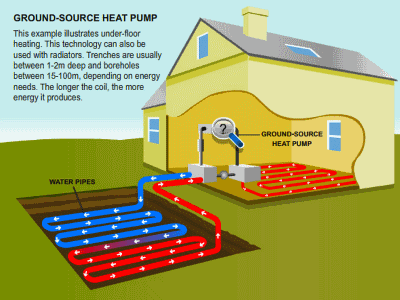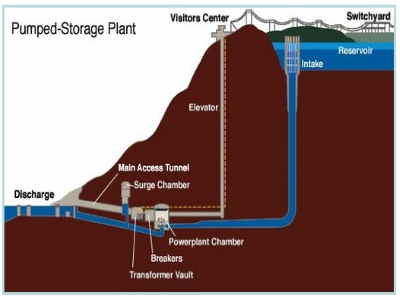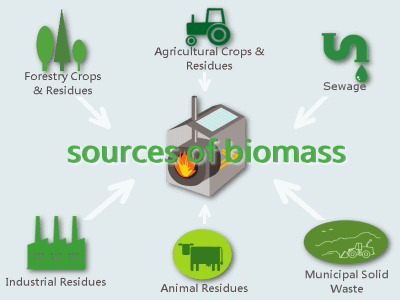
As well as saving energy it is worth thinking about whether you can generate your own power.
The savings can be huge. It’s good for your finances and the environment.
If you generate your own power, you’ll still need your traditional source of energy. But you won’t have to use it nearly as much. So you can say goodbye to big fuel bills.
Ways to generate your own power
There are many different methods of generating your own power or heat at home. Find out more about methods you could use to save money on your bills or even contribute power back to the grid.

Ground/Air
Ground source heat pumps (GSHPs) use pipes which are buried in the garden to extract heat from the ground. This heat can then be used to heat radiators, underfloor or warm air heating systems and hot water in your home.
Air source heat pumps absorb heat from the outside air. This heat can then be used to heat radiators, underfloor heating systems, or warm air convectors and hot water in your home.
A ground source heat pump circulates a mixture of water and antifreeze around a loop of pipe, called a ground loop, which is buried in your garden.
Heat from the ground is absorbed into the fluid and then passes through a heat exchanger into the heat pump.
The ground stays at a fairly constant temperature under the surface, so the heat pump can be used throughout the year.
The length of the ground loop depends on the size of your home and the amount of heat you need.
Longer loops can draw more heat from the ground, but need more space to be buried in. If space is limited, a vertical borehole can be drilled instead.
The benefits of ground source heat pumps
Could lower your fuel bills, especially if you replace conventional electric heating
Could provide you with income through the government’s Renewable Heat Incentive (RHI)
Could lower home carbon emissions, depending on which fuel you are replacing
No fuel deliveries needed
Can heat your home as well as your water
Minimal maintenance required
Unlike gas and oil boilers, heat pumps deliver heat at lower temperatures over much longer periods.
During the winter they may need to be on constantly to heat your home efficiently. You will also notice that radiators won’t feel as hot to the touch as they might do when you are using a gas or oil boiler.
Air source heat pumps are usually easier to install than ground source as they don’t need any trenches or drilling, but they are often less efficient than ground source heat pumps.
Water source heat pumps can be used to provide heating in homes near to rivers, streams and lakes.
How do ground source heat pumps work?
Heat from the ground is absorbed at low temperatures into a fluid inside a loop of pipe (a ground loop) buried underground. The fluid then passes through a compressor that raises it to a higher temperature, which can then heat water for the heating and hot water circuits of the house.
The cooled ground-loop fluid passes back into the ground where it absorbs further energy from the ground in a continuous process as long as heating is required.
If there is enough space, the collector loop can be laid horizontally in a trench about a metre or so below ground. Where there isn’t room to do this you can drill vertical boreholes to extract heat from much further down, typically 90 – 160 metres deep.
The space you need for a horizontal loop, and the depth you need for a borehole, will depend on many factors – your heat pump installer will design the collector array based on local conditions and the heat requirements of your home.
Heat pumps have some impact on the environment as they need electricity to run, but the heat they extract from the ground, the air, or water is constantly being renewed naturally.
Is a ground source heat pump suitable for me?
To tell if an air source heat pump is right for you, there are a few key questions to consider:
Things to consider:
Is your garden suitable for a ground loop? It doesn’t have to be particularly big, but the ground needs to be suitable for digging a trench or a borehole and accessible to digging machinery.
Is your home well insulated? Since ground source heat pumps work best when producing heat at a lower temperature than traditional boilers, it’s essential that your home is well insulated and draught-proofed for the heating system to be effective.
What fuel will you be replacing? The system will pay for itself much more quickly if it’s replacing an electricity or coal heating system. Heat pumps may not be the best option for homes using mains gas.
What type of heating system will you use? Ground source heat pumps can perform better with underfloor heating systems or warm air heating than with radiator-based systems because of the lower water temperatures required.
Is the system intended for a new development? Combining the installation with other building work can reduce the cost of installing the system.
Our downloadable guide provides helpful advice about how to get the most out of your heat pump.
You may also want to consider air source heat pumps, which extract heat from the outside air.

Hydro technology uses running water to generate electricity
Whether it’s from a small stream or a larger river, small or micro hydroelectricity systems, also called hydropower systems or just hydro systems, can produce enough electricity for lighting and electrical appliances in an average home.
How do hydropower systems work?
All streams and rivers flow downhill. Before the water flows down the hill, it has potential energy because of its height.
Hydro power systems convert this potential energy into kinetic energy in a turbine, which drives a generator to produce electricity. The greater the height and the more water there is flowing through the turbine, the more electricity can be generated.
The amount of electricity a system actually generates also depends on how efficiently it converts the power of the moving water into electrical power.
The benefits of hydro systems
A hydro system can generate 24 hours a day, often generating all the electricity you need and more.
Cheap heating and hot water
A hydro system may generate more electricity than you need for lighting your home and powering your electrical appliances – so you can use the excess to heat your home and your hot water too.
A cheaper option for off-grid homes
Installing a hydro system can be expensive, but in many cases it’s less than the cost of getting a connection to the National Grid if you don’t already have one. Find out more about off-grid options.
Cut your carbon footprint
Hydroelectricity is green, renewable energy and doesn’t release any harmful carbon dioxide or other pollutants.
The benefits of hydro systems
Will hydropower work for me?
Hydropower is very site specific. Most homes will not have access to a suitable resource even if they have a water course running nearby. Assessing a hydro site properly is a job for a professional. If you think you might have a suitable site the next step is to contact a certificated installer, who can assess your site.
To be suitable for electricity generation, a river needs to have a combination of
flow – how much water is flowing down the river per second, and
head – a difference in height over a reasonably short distance.
It’s also important to consider what happens to the river in summer. The minimum flow during dry periods is usually the deciding factor, no matter how impressive the river looks when it is in flood.
If there is a good hydro resource in or near your community it might be worth developing it as a community energy project, rather than as a system to supply just one home.
Off-grid
Is your home connected to the National Grid? If not, hydro schemes are one of the most reliable alternatives to mains supply for isolated properties, and can sometimes be cheaper to install than a new mains connection.
Costs, savings and financial support
Costs for installing a hydro system can vary, depending on the location and the amount of electricity you can generate.
Some sites cost less than this to develop; others cost much more due to the nature of the site and the equipment used.
Maintenance costs vary but are usually low as hydro systems are very reliable.
Savings will depend on the number of hours the turbine is able to run in a year, which in turn will depend on how often the level of the river is high enough to supply the system. Your installer will be able to predict this for you and estimate the amount of electricity that will be generated.
Hydro was eligible for Feed-in Tariffs, which earned a tariff for each kWh of electricity generated by your system.
Making the most of hydroelectricity
To make the electricity you produce go further:
Use low energy bulbs throughout your home – these produce the same amount of light as conventional bulbs and use up to 80 per cent less electricity.
Find out how more than 78,000 Americans have greatly benefited from this amazing creation, and found energy independence, Click Here!

Biomass
Wood-fuelled heating systems, also called biomass systems, burn wood pellets, chips or logs to provide warmth in a single room or to power central heating and hot water boilers.
A stove burns logs or pellets to heat a single room – and may be fitted with a back boiler to provide water heating as well. A boiler burns logs, pellets or chips, and is connected to a central heating and hot water system.
The benefits of biomass heating
- Affordable heating fuel
Although the price of wood fuel varies considerably, it is often cheaper than other heating options. - Financial support
Wood fuel boiler systems could benefit from the Renewable Heat Incentive (RHI) - A low-carbon option
The carbon dioxide emitted when wood is burned is the same amount that was absorbed over the months and years that the plant was growing. The process is sustainable as long as new plants continue to grow in place of those used for fuel. There are some carbon emissions caused by the cultivation, manufacture and transportation of the fuel, but as long as the fuel is sourced locally, these are much lower than the emissions from fossil fuels.
What Is A Liberty Generator?
The Liberty Generator is an efficient biogas generator that produces power using biogas, that is used for cooking, lighting & heating homes and buildings, power for running farm equipment, and even for transportation purposes.
Check Out The Best & Most Affordable Biogas Generator Plans!
Now imagine, what if you could cut your electricity bill a lot? So much so that it actually makes a difference in your personal economy. Because let’s face it, a lot of Americans live from paycheck to paycheck. That means every dollar saved makes a huge difference. That’s more money in your pocket. Everyone would agree that would be awesome, right?
So for those of you who are looking to have a biogas generator to generate your own power, what if you could build a biogas generator for less than a hundred dollars? In fact, much less than you think? Because many times, we assume that it would be expensive to build a biogas generator for our own home use.
Savings
Savings in carbon dioxide emissions are very significant – up to 14.3 tonnes a year – when a wood-fuelled boiler replaces a solid (coal) fired system. Financial savings are more variable – if you replace an older LPG heating system with a wood-burning system you might save up to $1,205 a year, but if you are replacing an old electric heating system you could save as much as $960 per year. However, if you currently have a newer (more efficient) system, such as a modern condensing gas or oil boiler, a biomass boiler is likely to cost you more to run than your current system.
Biomass boilers and stoves should be kept clean and swept regularly to remove ash. Ash quantities are generally very low (less than one per cent of fuel volume), but you will still need to empty the ash bin of a wood burning stove or boiler. This is likely to be weekly and never more than once a day. A log fire requires ash removal before every use.
Some appliances, particularly boilers, have self-cleaning systems which will collect ash from the combustion grate and the heat exchanger tubes. If there is no automatic ash cleaning mechanism in place the boiler will need to be shut down periodically so that this can be done by hand. If the ash is not cleaned out regularly, it will build up and adversely affect combustion conditions, which can lead to boiler failure and shut down. Some boilers have a mechanism for compressing the ash which reduces the number of times the ash bin needs to be emptied.
With automatic ash removal and cleaning of the heat exchanger the only other maintenance requirement will be occasional ash removal and an annual maintenance check. If you have a wood burning stove or boiler the chimney and flue pipe must be swept regularly to remove all soot deposits and prevent blockage. HETAS recommend that this “should be done at least twice a year, preferably before the heating season to check that the flue has not been blocked by bird’s nests for example and also at the end of the heating season to prevent soot deposits from resting in the chimney during the dormant period”.
Choosing a wood-fuelled heating system
Boiler or stove?
Boilers can be used in place of a standard gas or oil boiler to heat radiators for a whole house, and to heat the hot water. Stoves are used to heat a single room, usually in conjunction with other heating systems, but may also have a back boiler to provide hot water. Stoves are not eligible under the domestic RHI unless it is a pellet stove with a back boiler.
Chips, pellets or logs?
Chips are used to heat larger buildings or groups of houses.
Pellets are much easier to use and much more controllable than logs. Pellet boilers can run automatically in much the same way that gas or oil boilers operate. Most pellet and chip burners use automatic fuel feeders which refill them at regular intervals.
Log-burning stoves and boilers have to be filled with wood by hand and require considerably more work. You will need a lot of logs to heat a whole house, but they can be cheaper than pellets if you have a good local supply.
Do you have a local fuel supplier?
Some companies now offer deliveries of pellets anywhere, while the supply of logs is more variable.
Do you have space?
Wood boilers are larger than gas or oil equivalents and you will need space to store the fuel. This area will need to be somewhere that’s handy for deliveries as well as appropriate for feeding the boiler.
When the power goes out, your safety and comfort is important.
Protect your home with a new fully automatic standby generator. Maintain your security system, lighting and air conditioning to keep your family or business safe and comfortable through any power outage
Enjoy the total peace of mind that comes with knowing you have a constant and reliable power supply for your home or business in with a standby generator from Alternate Power Solutions. From everyday necessities like heating, cooling, refrigeration and lights, to daily essentials like cooking, laundry or kids bath times. Power outages are occurring more frequently than ever and lasting longer with devastating effects.
Stand up to unpredictable weather and unforeseen outages with the most trusted name in residential standby power with backup generators for homes. If the power ever goes out, your General standby generator goes on – automatically – protecting you and your home 24/7.
Books can be your best pre-collapse investment.
Carnivore’s Bible (is a wellknown meat processor providing custom meat processing services locally andacross the state of Montana and more. Whether your needs are for domestic meator wild game meat processing)
The Lost Book of Remedies PDF ( contains a series of medicinal andherbal recipes to make home made remedies from medicinal plants and herbs.Chromic diseases and maladies can be overcome by taking the remediesoutlined in this book. The writer claims that his grandfather was taughtherbalism and healing whilst in active service during world war twoand that he has treated many soldiers with his home made cures. )
Easy Cellar(Info about building and managing your root cellar, plus printable plans. The book on building and using root cellars – The Complete Root Cellar Book.)
The Lost Ways (Learn the long forgotten secrets that helped our forefathers survive famines,wars,economic crisis and anything else life threw at them)
LOST WAYS 2 ( Wordof the day: Prepare! And do it the old fashion way, like our fore-fathers did it and succeed longbefore us,because what lies ahead of us will require all the help we can get. Watch this video and learn the 3 skills that ensured our ancestors survival in hard times offamine and war.)


